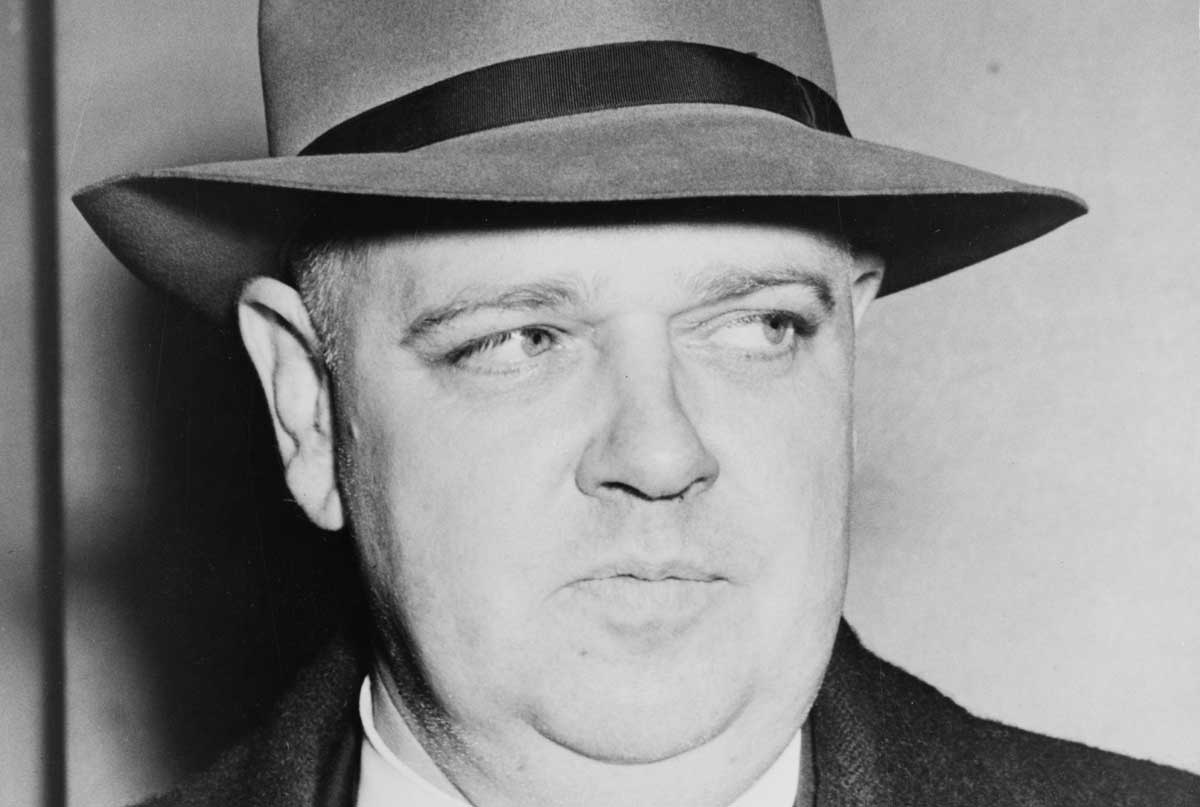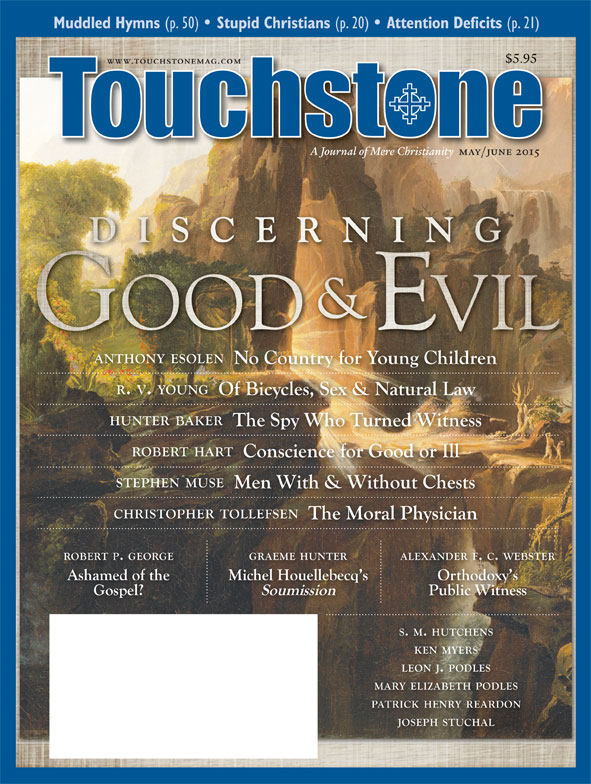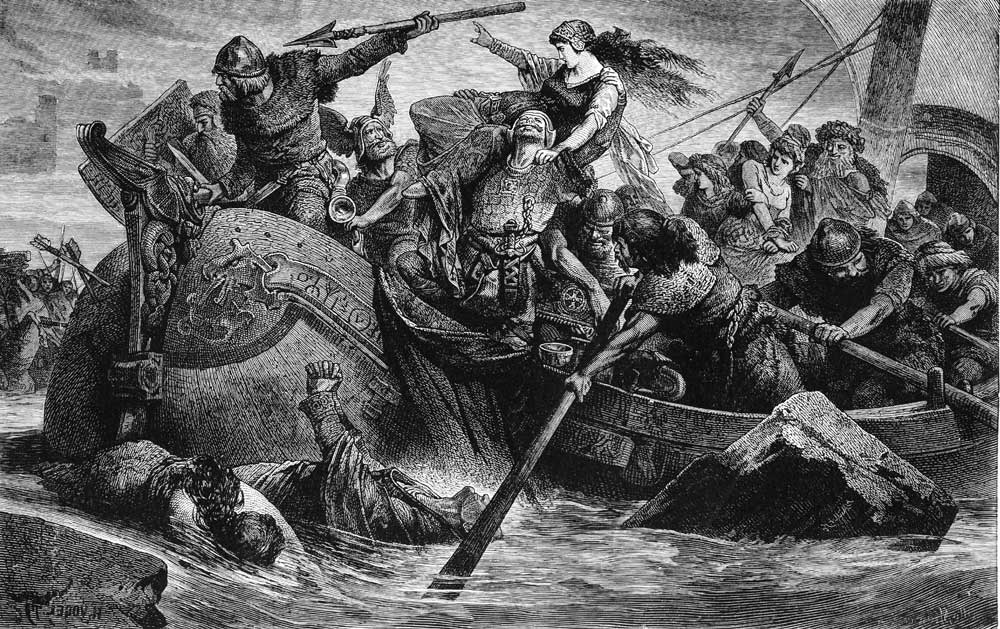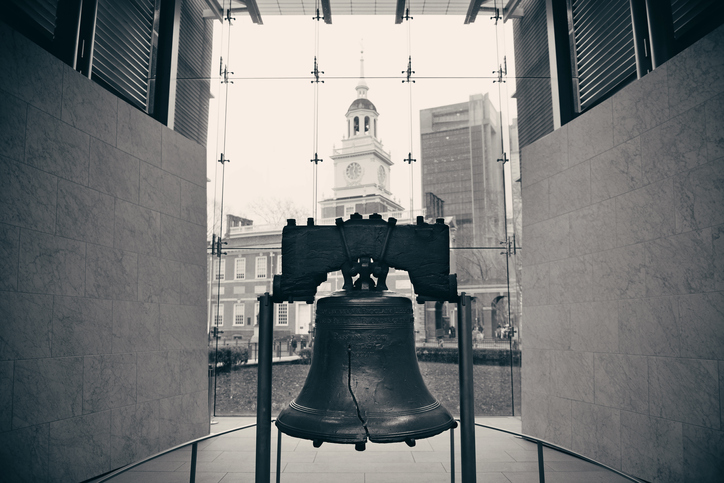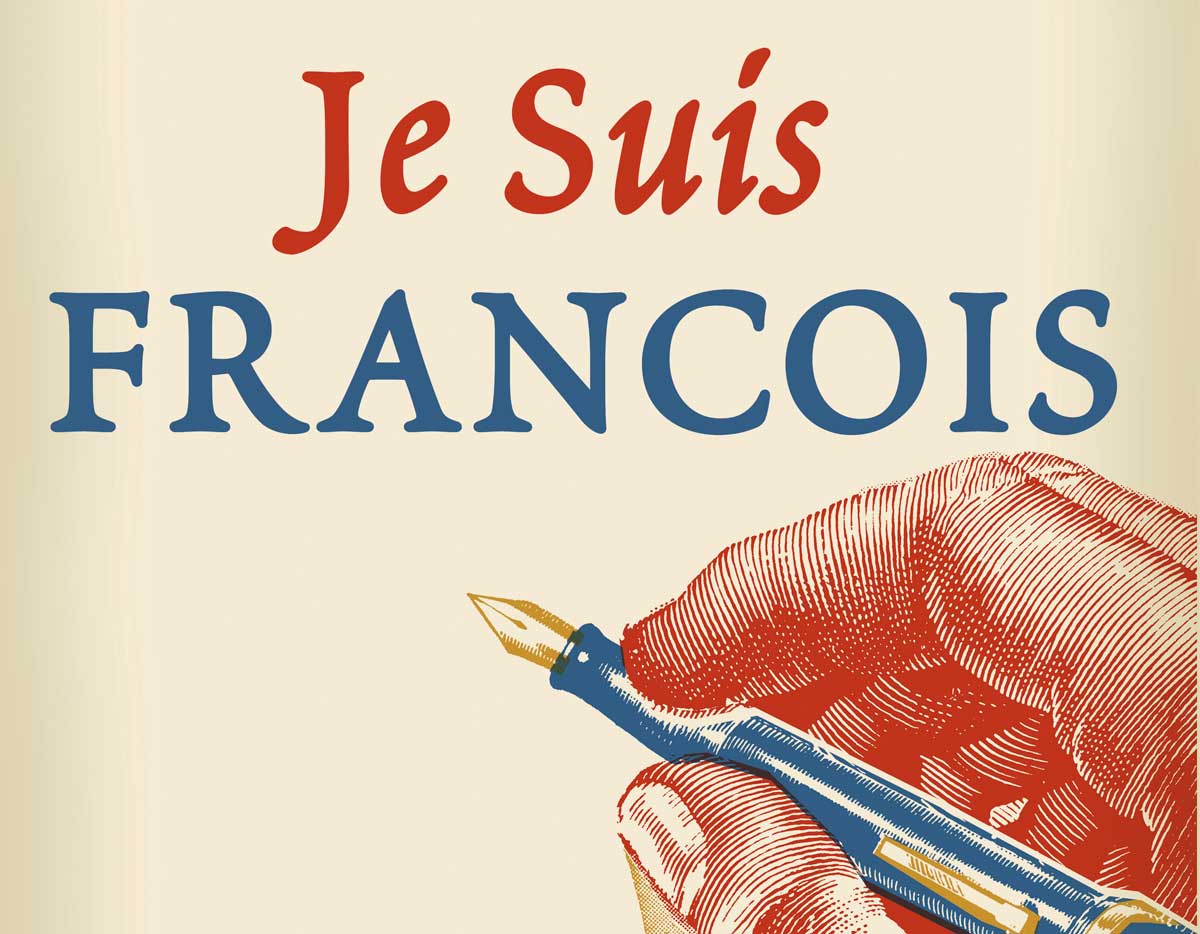Feature
The Spy Who Turned Witness
Whittaker Chambers's Lonely War Against Godless Collectivism
by Hunter Baker
Cultural elites in Hollywood and the media have worked hard to preserve memories of abuses committed by anti-Communists during the Cold War. Many films portray the blacklisting of Hollywood Communists over a period of years in the mid-twentieth century. Others deal with the unhappy career of Senator Joseph McCarthy, whose name is still often invoked in our modern debates, as some speak of McCarthyism or McCarthyite tactics. The complaint that arises from the record of those years is that there were Americans who suffered damage to their lives and careers for the simple reason that they had been associated in some way with Communists or were Communists themselves.
Two questions book-ended the period we now refer to as the Red Scare. At the beginning, there was the inquisitorial question, "Are you now or have you ever been a Communist?", which was a weapon wielded by investigators to great effect for a time. And at the end, there was Joseph Welch's damning interrogatory, aimed at Senator McCarthy: "At long last, have you no sense of decency?"
McCarthy ultimately died, disgraced and discredited. Today, we write off the era in question as one of paranoia. But is that all it really was? Was it just an exercise in retrograde, populist politics of the worst sort? Certainly, the stakes were high enough to justify the level of public alarm. The United States spent decades locked in enmity with the Soviet Union and world Communism. These two nations embodied two completely different systems of thought about human life and its meaning. One was committed to destroying the other and bringing the entire world under its influence. The other was determined to preserve the liberty it viewed as something of a genetic birthright and a gift from God. Roughly forty of those years were spent under the looming cloud of nuclear disaster.

There is more to the tale than the memory our popular history has left to us. The Red Scare, the sometimes reckless McCarthyism, the blacklisting of the Hollywood Ten—these things happened, to be sure. But questions remain for our consideration. Does this disreputable record mean that there were no American Communists who posed a serious threat to their country? Was the effort to find them and stop them nothing but an extended march of folly? To these, let us add another question not yet suggested: Did the Cold War have dimensions much larger and deeper than we tend to think of today?
In other words, was it about much more than the best way to construct and organize a modern economy?
The answers to those questions continue to be relevant. We can explore them by considering the case of a man who would eventually take the name Whittaker Chambers. He is important because he bore witness much more closely than most.
A House of Horrors
There once was a child named after his father. He was perhaps named after his dad in the way boys sometimes are in an attempt to create family commitment and paternal instinct in situations where those things are suspected to be lacking. This boy was Jay Vivian Chambers. He was born in 1901. His mother had been a touring actress (but never anything close to a star). His father was a commercial artist and also, it turned out, a bisexual, who would eventually abandon the family and then return, but with the tendency to be unaccountable for his time. They were sometimes known in their New York community as "the French family." Jay had a younger sibling. Both his father and his younger brother would pre-decease him, despite the fact that he did not live a long life himself.
Later on, his grandmother would join the household. She was increasingly insane. As a young adult, Jay would occasionally have to confront her and take away her scissors, which she wielded in a threatening manner. He didn't get away without scars, including mental ones. In his memoir, he would write of his wish as a young man that the house of horrors in which he grew up would burn to the ground.
His brother, who would eventually kill himself in his late twenties, invited him on multiple occasions to join him in committing suicide. "We are too gentle to face the world," he said. While young Jay chose to live rather than to end his life, he was tempted by his brother's invitation. He had a tragic view of the world that is well captured by his reaction as a child to seeing a group of boys urinate on a lollipop and then lie in wait for a classmate. When the classmate appeared, they offered him the candy with every appearance of innocence and then broke out into wild howls when he licked it. Chambers said that from that point on he was always expecting someone to offer him a tainted lollipop under the guise of an illusory beneficence.
Chambers's mother was determined for him to attend a respectable college. He went to Columbia. Legendary professors such as Mark van Doren and John Erskine were there at the time. His contemporaries as students included men who would gain fame for their intellectual achievements: Lionel Trilling, Mortimer Adler, Jacques Barzun. They all knew Chambers, who made a literary splash during his time at the school and who was eventually kicked out for stealing library books, which is also how he lost his job at the New York Public Library.
Attracted to Communism
It mattered relatively little to Chambers when he wore out his welcome at college. By that time, he had begun to experience Communism in much the same way many come to know Christianity. He attended meetings and got to know people. In Marx, he felt he had discovered the correct diagnosis of the world crisis. And in Lenin, he believed he could discern the treatment. Before being terminated at the library, Chambers used his time manning an information desk to read Marxist literature. A man observed him doing so and introduced himself. The two spent time together, and Chambers came to feel that this man was the most integrated individual he had ever met. Very often, such people are the most attractive evangelists of what they believe. The new acquaintance helped bring Chambers more fully into the Communist movement in the United States.
Chambers worked his way up as an American Communist. He began with light duties, helping out with a publication called The Daily Worker and eventually becoming employed there. But Soviet-dominated Communism in those early days was incredibly tumultuous. If you landed on the wrong side of an argument, you could end up severely out of favor or even dead.
Chambers experienced disfavor because of his associations and was ostracized. But he returned as a hot literary property among American Communists when he wrote a hit play about starving farmers who resorted to radical measures to feed their children. He then became editor of a leading Communist publication, The New Masses. The story might have ended there, with Chambers developing an ever-growing reputation as a literary Communist, or maybe with his image just slightly softening and his becoming the kind of American author (like some of his contemporaries) who picks up Pulitzer Prizes and writing fellowships.
Immersion & Extrication
But that is not how it ended. The Communist underground, which had a pipeline running directly to the Soviet Union, reached out to him. The proposition was simple: Give up your life as you know it. Become an agent in the pay of a foreign power for the cause of revolution. Chambers asked for a few days to consider it. When he returned, he said no, but he was told there was no choice in the matter. So he gave up his editorship of The New Masses and became a spy.
The new man of the Communist underground moved money around and served as a courier for sensitive material. He learned to take circuitous routes to meetings and to vary his habits so as to be unpredictable and to avoid drawing unwanted attention. Having gained the trust of his handlers, Chambers began working with groups of Americans operating at high levels within the U.S. government who were sympathetic to the Communist cause and were willing to work against their own country. He coordinated efforts with members of the Ware group, which was begun among bright New Dealers within the Department of Agriculture. It was there that he first became acquainted with a young lawyer named Alger Hiss.
Chambers eventually became a major point of contact for individuals in the State Department and other parts of the government. Communists within the U.S. government provided him with a wide variety of secret documents that extended even to military intelligence on such things as weaponry and bombsights. Chambers had the documents photographed and preserved on microfilm, which he then hid in innocuous-looking packages that he made sure went to Moscow. It was an incredibly laborious and time-consuming process that often left him exhausted. (It is interesting to think about how much easier it is to transmit such information today. Names such as Snowden, Assange, and Manning come to mind. One wonders whether it is possible to keep secrets anymore.)
Chambers performed this work for a period of about six years. At any time, he could have been captured and tried for treason or gotten tangled up in Communist politics and killed. Ultimately, he decided he could not do it any longer and planned his exit. But leaving the spy business is not like resigning any other position. Chambers could not simply stop being a spy and resume a normal American lifestyle. What he did instead was to drop out of sight completely. He had a wife and children to protect.
Thanks to a natural gift for languages, Chambers was able to obtain contracts to translate foreign books and novels for the American market. It didn't matter where he lived in order to do this kind of freelance job. So the family moved around. Chambers often performed his work at odd hours, keeping a gun handy. Despite the insecurity and irregularity of the work and of their family existence, the once unreliable youth somehow managed to hold his family together and to evade the underground Communist apparatus. Those were dark and meager times.
A Golden Period
And then, surprisingly, things changed. A friend recommended the man now known not as Jay Vivian Chambers or by any of his underground aliases, but as Whittaker Chambers (a combination of his mother's maiden name and his true surname) for a job at Time magazine. It was the name he would be known by for the rest of his life and one that would gather both fame and infamy.
Just as he had in his lives as a public Communist and then as an underground spy, Chambers began simply. He wrote book reviews for the magazine, which appeared in the culture section in the back pages. Henry Luce (the creator of the Time/Life/Fortune publishing dynasty) soon recognized his talent, proclaiming one of his pieces to be the best book review the magazine had ever published. In time, Chambers gained responsibility for the entire back of the book. Under his leadership, and thanks in large part to his amazing gifts as a writer, many came to recognize the back of the book as the finest part of the magazine.
Though guarded and careful early on, Chambers would eventually turn his section of the magazine into a powerful platform for anti-Communism. His efforts made him a controversial figure at Time. Many writers at the magazine disagreed with his crusade against Communism, but Chambers had the protection of the editor in chief. At one point, he even gained control of the Foreign News department and continued his battle there. By the end of his tenure at Time, he had become one of a handful of senior editors and was earning $30,000 a year, which was an almost unheard of salary during
the 1940s.
But during his entire golden period at Time, the facts of his past haunted Chambers. There were a number reasons for this. First, he continued to fear that he would be found out by his former spymasters and "liquidated," the term used in the underground for killing those who made a mistake or turned against the Communists. Second, he felt a great gloom due to his certainty that by choosing the free world over the Communist one, he was switching from the winning to the losing side. Third, he had been an active traitor to his country and feared not only the loss of his job, but criminal prosecution as well. Despite these potentially crippling fears, Chambers used everything he had at his disposal to combat the side he'd turned against.
Going to the Government
Or maybe we should say almost everything. He had yet to perform the service that would cost him the most. In his early days at Time, Isaac Don Levine, a journalistic colleague in whom he confided about his past, began the work of convincing him to take his story to the government. One of the first steps Levine took was to put Chambers in touch with another defector and member of the underground, Walter Krivitsky. Krivitsky was a Russian who had published his experiences in The Saturday Evening Post.
When the two men met, Krivitsky asked Chambers a single question in German, which was the international language of Communism at the time: "Ist die Sowjetregierung eine faschistische Regierung?" Chambers answered, "Ja, die Sowjetregierung ist eine faschistische Regeirung." Krivitsky had asked Chambers whether the Soviet regime was a fascist one. Chambers affirmed the proposition. The two men ended up talking through the night to the next morning.
Chambers's association with Krivitsky underscored the danger of their turn away from the Soviets, for Krivitsky later died under suspicious circumstances. He had informed his wife that if anything happened to him, she should assume he had been murdered.
The next step was for Chambers to go to the government. He initially insisted it had to be President Roosevelt. That proved impossible, but his friend Don Levine was able to arrange a meeting with the rich and powerful Assistant Secretary of State Adolf Berle. Chambers spoke at length with Berle and was surprised to hear nothing after their meeting.
It later turned out that Berle had relayed Chambers's story to the president, but Roosevelt had refused to believe it and so did nothing about it, in fact telling Berle in more colorful language to jump in a lake. While Chambers was distressed at this, he also felt he had done his duty. Nearly a decade would go by before he would be forced to endure a true reckoning with his past.
The Alger Hiss Trials
In 1948, Chambers was subpoenaed by the much-maligned House Un-American Affairs Committee, also known as HUAC. He had become of interest to the committee in the wake of the testimony of Elizabeth Bentley, the woman who had succeeded him as courier to the Washington underground. Chambers did testify, but was not fully forthcoming. He may have been trying to protect old friends such as Alger Hiss by not revealing everything.
Nevertheless, his testimony was enough to cause Hiss's friends to urge him to sue his accuser for slander. Hiss did so, but it proved to be a mistake on his part. He may have believed that Chambers had been reticent in his testimony for lack of proof, but in that regard he was wrong. In the course of legal proceedings, Chambers produced his "life raft" of State Department documents and microfilm he had kept hidden in a pumpkin on his farm. So instead of Chambers facing a slander suit, Hiss was tried for perjury.
Despite the evidence against him, Hiss managed to mobilize a powerful roster of highly placed Americans to vouch for his character. These included two Supreme Court Justices and a future Democratic presidential nominee. The first trial ended in a hung jury, with eight in favor of conviction and four against. In the second trial, with the prosecutor possessing greater mastery of the case, the jury returned a conviction. Hiss was sentenced to five years and was disbarred.
Though the sentence seems light, Hiss's fall was spectacular. He had been with Franklin Delano Roosevelt at the postwar Yalta conference. Having failed to overcome his accuser, he would never occupy a position of influence again.
To this day, no one can be sure how much damage Hiss had done. We know from Chambers that he passed on secret documents and communications to the Soviets. But bigger things are possible. Had Hiss been able to influence the American president and his policy and in a way amenable to Soviet interests?
Because of the controversy over the case and his own exposure as a former Soviet agent, Chambers resigned from Time. While Luce wanted to bring him back, other writers and editors strenuously resisted the idea. So Chambers was left alone with a wife and children to support. But there was one great work left in the former Communist. He would bear witness through his memoir, a massive work published in 1952 under the title Witness.
Fighting the Nightmare
Chambers's story proves that there really were highly placed Communists in the American government in the 1930s and 1940s. The so-called Red Scare was not just some irrational and cynical ploy by opponents of the New Deal. No matter how ham-fisted and blundering McCarthy and others may have been, Chambers had the goods. But there is more to be said about the question of why Chambers made the journey from what he believed to be the winning side to the losing side. Why did he decide to fight against Communism, especially when we consider what it cost him? What was he contending against?
Part of what spurred Chambers to fight for what he saw as a doomed cause was the simple outworking of Communism in the twentieth century. He recognized from the beginning that terror was a necessary part of Communist policy. Followers of Lenin had to accept as much. But it is one thing to accept tactics of terror intellectually and another to see and hear about them affecting human beings. After reading one account of the slave labor camps in Soviet Russia, Chambers began to hear the screams of the persecuted in his soul. He said to himself, "This is evil, absolute evil. Of this evil, I am a part." The Marxist dream was not compelling enough to diminish the power of the nightmare unfolding in broad daylight. He decided—inspired, he believed, by God—to fight against the nightmare.
As his affection for the worldwide Marxist cause diminished because of the news of abuse and terror, he also acquired more positive inspiration. Chambers became a father during his time in the underground.
When his wife informed him she was pregnant, he told her to arrange an abortion, the common practice for those working in Communist espionage. But she came back from the doctor saying simply that she was in good health to have a baby. Seeing his confusion, she broke into tears and said she couldn't kill her baby. Rather than becoming angry, Chambers found himself feeling joyful. The child helped bring him closer to God. He describes one turning point thus:
My daughter was in her high chair. I was watching her eat. She was the most miraculous thing that had ever happened in my life. I liked to watch her even when she smeared porridge on her face or dropped it meditatively on the floor. My eye came to rest on the delicate convolutions of her ear—those intricate, perfect ears. The thought passed through my mind; "No, those ears were not created by any chance coming together of atoms in nature. They could have been created only by immense design." The thought was involuntary and unwanted. I crowded it out of my mind. But I never wholly forgot it or the occasion. I had to crowd it out of my mind. If I had completed it, I should have had to say: Design presupposes God. I did not then know that, at that moment, the finger of God was first laid upon my forehead.
He began to see Communism as a revolt by man against the idea of a providential God who loved the world. Marx had insisted that God was nothing more than a tool designed to manipulate the poor. Chambers had believed that, but now, faced with his daughter, "the most miraculous thing" that had ever happened in his life, he began to question his old secular prophet. Instead of seeing God as a cynical invention, an ugly something, he came to see him as a someone, as a reality. Chambers was on his way to becoming a Christian. He would eventually be baptized in an Episcopal church, and he attended the meetings of Quakers, where he felt God moving among the gathered souls.
Uneasy Alliance
In the years after he left Time, Chambers became friends with William F. Buckley. That young man had become a rising star with the publication of God and Man at Yale, and he was also a prominent defender of McCarthy. Having read Chambers's Witness, which was undeniably a great book and a far better brief against Communism than anything he would have seen from the Wisconsin senator, Buckley set out to recruit the talented, but weary ex-spy for his new magazine, National Review.
Chambers resisted. He wasn't sure he wanted to be part of what he saw as a hard-right approach to politics, and he suspected it wasn't realistic to hope to influence public affairs from such a position. But eventually Buckley won him over. Chambers's best-known work at National Review is probably his damning review of Ayn Rand's Atlas Shrugged. The piece achieved Buckley's purpose of reading Rand out of the conservative movement. Chambers periodically visited the offices of the magazine, and he worked for it until his health became too fragile for even that labor.
Looking back upon Chambers's uneasy alliance with National Review, which was something the admiring Buckley struggled to understand, we might consider the journal's declared mission to "stand athwart history yelling, 'STOP!'" Whittaker Chambers did not conceive his mission in those negative terms. He wanted to be remembered as something more than a witness against Alger Hiss and Communism. Rather, he hoped to serve as a witness for "God and his purposes in eternity."
He would not live to see his hope vindicated, as he died of a massive heart attack at age 60, with the two great powers still locked in struggle. His old friend turned enemy Alger Hiss would live to the advanced age of 88, just long enough to witness the fall of the Soviet Union. Chambers would have been gratified by the events of the last decade of the millennium, in which an iron curtain was torn and many captives freed. •
—The history of the events discussed in this essay derives largely from Chambers's astounding memoir, Witness, and Sam Tanenhaus's biography, Whittaker Chambers.
Hunter Baker , J.D., Ph.D., is the dean of arts and sciences at Union University, a fellow of the Ethics and Religious Liberty Commission, and an affiliate scholar of the Acton Institute.
subscription options
Order
Print/Online Subscription

Get six issues (one year) of Touchstone PLUS full online access including pdf downloads for only $39.95. That's only $3.34 per month!
Order
Online Only
Subscription

Get a one-year full-access subscription to the Touchstone online archives for only $19.95. That's only $1.66 per month!
bulk subscriptions
Order Touchstone subscriptions in bulk and save $10 per sub! Each subscription includes 6 issues of Touchstone plus full online access to touchstonemag.com—including archives, videos, and pdf downloads of recent issues for only $29.95 each! Great for churches or study groups.
Transactions will be processed on a secure server.
more on history from the online archives
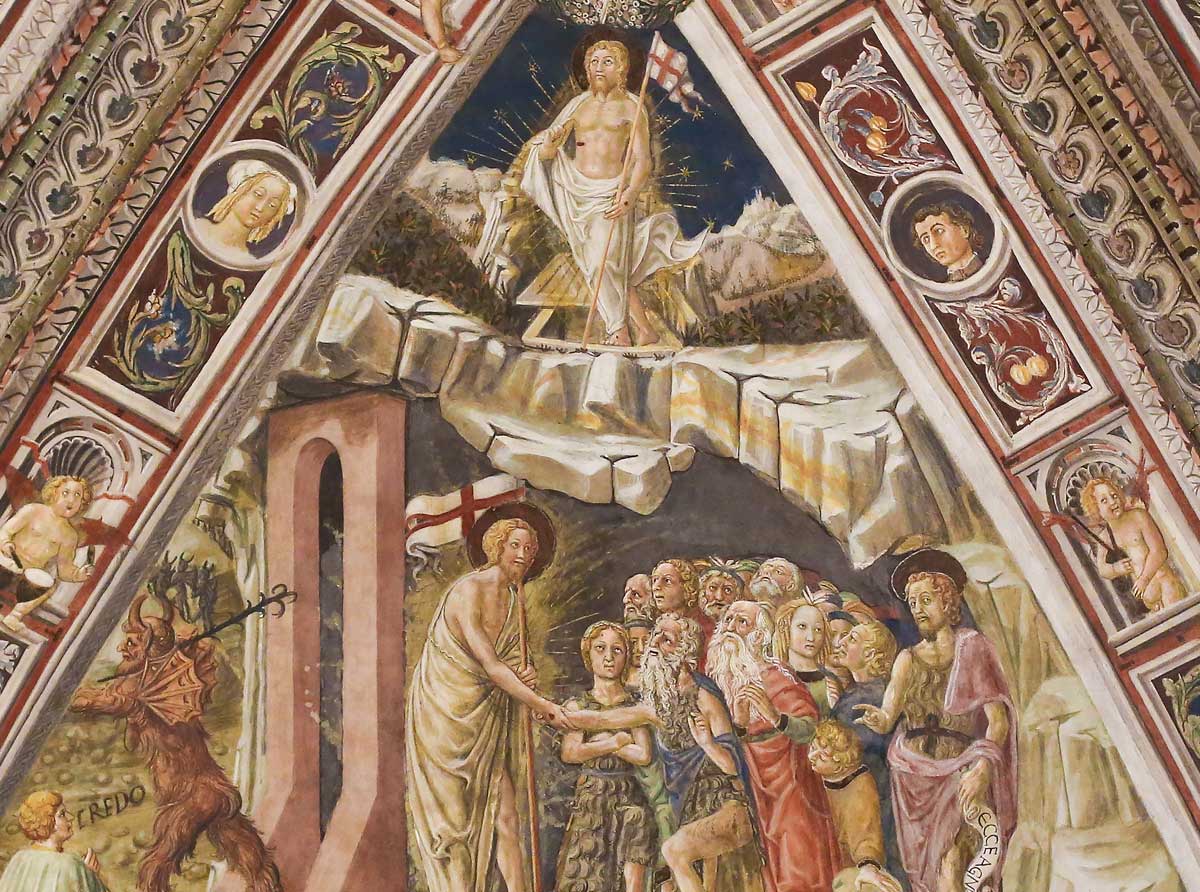
14.6—July/August 2001
The Transformed Relics of the Fall
on the Fulfillment of History in Christ by Patrick Henry Reardon

15.6—July/August 2002
Things Hidden Since the Beginning of the World
The Shape of Divine Providence & Human History by James Hitchcock
more from the online archives
calling all readers
Please Donate
"There are magazines worth reading but few worth saving . . . Touchstone is just such a magazine."
—Alice von Hildebrand
"Here we do not concede one square millimeter of territory to falsehood, folly, contemporary sentimentality, or fashion. We speak the truth, and let God be our judge. . . . Touchstone is the one committedly Christian conservative journal."
—Anthony Esolen, Touchstone senior editor





